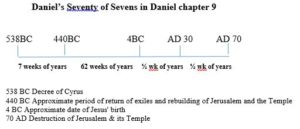
Daniel’s Prophecy of the Seventy Sevens
Guest writer: Dr. Leong Tien Fock
[The Book of Daniel prophesied that the Messiah will be killed during the time of the Roman Empire. The prophecy was fulfilled 500 years later when Jesus Christ was crucified by the Romans]
The Book of Daniel, written by about 530 BC, laid out in advance the historical time-frame within which the Messiah would come. Through dreams given to Nebuchadnezzar (Daniel 2) as well as to Daniel (Daniel 7 and 8), God revealed that the Babylonian Empire (Dan. 2:38) would be subsequently replaced by the Medo-Persian Empire (Dan. 8:20; cf. Dan. 5:28), the Greek Empire (Dan. 8:21), and an unnamed fourth kingdom, which we know from history to be the Roman Empire (for a thorough defense that the fourth empire is the Roman Empire, see Young 1977: 275-94).
It is specifically revealed that the Kingdom of God would come during the fourth kingdom to replace all earthly kingdoms (Dan. 2:44-45). And this would happen when “one like a Son of Man” is given “dominion … and a kingdom, that all the peoples, nations and languages should serve Him” and whose “dominion is an everlasting dominion” and whose “kingdom is one which shall not be destroyed” (Dan. 7:13-14). In other words, the Messiah would come during the Roman Empire…
Jerusalem and the Temple are prophesied to be destroyed by “the people of the prince who is to come” (Dan. 9:26). Since it was a Roman army that destroyed them in AD 70, “the prince who is to come” (literally “the coming prince”) has to be the Roman prince Titus Vespasianus, who was then in command of the Roman army. But there is a tendency to interpret this prince as the future Antichrist. This interpretation does not make sense as the people and their prince have to be contemporaries.
Actually it is based on, and in fact required by, the assumption that the “prince who is to come” has to be a prince in the future from our standpoint as readers. So this prince will come in our future and hence cannot possibly be Titus in the first century. However the coming of the prince in Daniel 9:26 “is [in the] future from the standpoint of Dan[iel the writer]” (Young 1977: 212), and not from the standpoint of the readers (who spread across the millenniums). From Daniel’s standpoint, this future prince has to be Titus as he commanded the army that destroyed Jerusalem and the Temple.
Nevertheless, regardless of how we interpret the term “sevens” and the other details of the prophecy, of particular relevance here is the prediction that the Messiah would die before the destruction (again) of Jerusalem and the Temple in AD 70. Since Jesus died in about AD 30, He fulfilled this prediction as well. This is particularly significant because it pegs the time of the Messiah’s coming to a recognized historical event.
Before AD 70 Jews and Gentiles who accepted Jesus as the Messiah did so without the benefit of this additional piece of evidence from Daniel to help them identify Him as the Messiah. But for people living after AD 70 this prophecy adds further weight for identifying Jesus as the Messiah, the Servant of Isaiah 53, whose death is said to make atonement for sin. For God not only reaffirmed through Daniel the atoning death of the Messiah, He also specified that this would happen before AD 70.
And no sane scholar would ruin his reputation by saying that Isaiah 53 or Dan. 9:24-27 was written after Jesus’ death on the cross. If they reject the obvious conclusion that Jesus fulfilled these prophecies, they would rather do so by avoiding a plain reading of the respective texts. Nevertheless the fact remains that the death of Jesus uncannily matches a plain reading of these texts. To dismiss this fact as just an incredible “coincidence” exposes one’s prejudice.
Read the full article given below:Daniel's Prophecy of the Seventy Sevens LTF
*Dr Leong Tien Fock has been studying the relevance of the Old Testament to the Church and the world for over 20 years. This has culminated in his recent book entitled Our Reason for Hope: An Exposition of the Old Testament on the Meaning of History. He has a degree in Civil Engineering from the University of Malaya and an M.A. in Old Testament Studies from Wheaton College Graduate School. His masters’ thesis is on the interpretation of Ecclesiastes entitled The Realism of Ecclesiastes. He also has an M.A. and a Ph.D. in (ancient) Near Eastern Languages and Cultures from the University of California, Los Angeles. His Ph.D thesis, entitled Tense, Mood and Aspect in Old Babylonian, is a computer-assisted linguistic analysis of the language of Hammurabi.
BONUS: You may download free copies of two books written by Dr. Leong Tien Fock at the links given below: